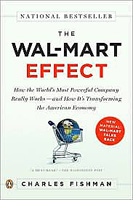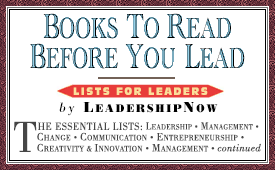
|
 |
The Wal-Mart Effect : How the World's Most Powerful Company Really Works--and How It's Transforming the American Economy Charles Fishman 
Format: Paperback, 336pp. ISBN: 9780143038788 Publisher: Penguin Pub. Date: December 26, 2006 Average Customer Review: For Bulk Orders Call: 626-441-2024 Description and Reviews From The Publisher: An award-winning journalist breaks through the wall of secrecy to reveal the many astonishing ways Wal-Mart's power affects our lives and reaches all around the world. The Wal-Mart Effect: The overwhelming impact of the world's largest company--due to its relentless pursuit of low prices--on retailers and manufacturers, wages and jobs, the culture of shopping, the shape of our communities, and the environment; a global force of unprecedented nature. Wal-Mart is not only the world's largest company; it is also the largest company in the history of the world. Americans spend $26 million every hour at Wal-Mart, twenty-four hours of every day, every day of the year. Is the company a good thing or a bad thing? On the one hand, market guru Warren Buffett estimates that the company's low prices save American consumers $10 billion a year. On the other, the behemoth is the #1 employer in thirty-seven of the fifty states yet has never let a union in the door. Though 70 percent of Americans now live within a fifteen-minute drive of a Wal-Mart store, we have not even begun to understand the true power of the company and the many ways it is shaping American life. We know about the lawsuits and the labor protests, but what we don't know is how profoundly the "Wal-Mart effect" is shaping our lives. Fast Company senior editor Fishman, whose revelatory cover story on Wal-Mart generated the strongest reader response in the history of the magazine, takes us on an unprecedented behind-the-scenes investigative expedition deep inside the many worlds of Wal-Mart. He reveals the radical ways in which the company is transforming America's economy, our workforce, our communities, and our environment. Fishman penetrated the secrecy of Wal-Mart headquarters, interviewing twenty-five high-level ex-executives; he journeyed into the world of a host of Wal-Mart's suppliers to uncover how the company strong-arms even the most established brands; and journeyed to the ports and factories, the fields and forests where Wal-Mart's power is warping the very structure of the world's market for goods. Wal-Mart is not just a retailer anymore, Fishman argues. It has become a kind of economic ecosystem, and anyone who wants to understand the forces shaping our world today must understand the company's hidden reach. Reviews Fishman shops at Wal-Mart and has obvious affection for its price-cutting, hard-nosed ethos. He also understands that the story of Wal-Mart is really the story of the transformation of the American economy over the past 20 years. He's careful to present the consumer benefits of Wal-Mart's staggering growth and to place Wal-Mart in the larger context of globalization and the rise of mega-corporations. But he also presents the case against Wal-Mart in arresting detail, and his carefully balanced approach only makes the downside of Wal-Mart's market dominance more vivid. Through interviews with former Wal-Mart insiders and current suppliers, Fishman puts readers inside the company's penny-pinching mindset and shows how Wal-Mart's mania to reduce prices has driven suppliers into bankruptcy and sent factory jobs overseas. He surveys the research on Wal-Mart's effects on local retailers, details the environmental impact of its farm-raised salmon and exposes the abuse of workers in a supplier's Bangladesh factory. In Fishman's view, the "Wal-Mart effect" is double-edged: consumers benefit from lower prices, even if they don't shop at Wal-Mart, but Wal-Mart has the power of life and death over its suppliers. Wal-Mart, he suggests, is too big to be subject to market forces or traditional rules. In the end, Fishman sees Wal-Mart as neither good nor evil, but simply a fact of modern life that can barely be comprehended, let alone controlled. —Publishers Weekly, Copyright © Reed Business Information, a division of Reed Elsevier Inc. All rights reserved. About the Author Charles Fishman is a senior editor at Fast Company. In 2005 he was awarded the prestigious Gerald Loeb Award, the highest award in business journalism, and he had been a finalist for the Loeb in three of the last four years. In 2004 his story about Wal-Mart was given the New York Press Club's award for the best magazine story about business. He has appeared regularly on NPR, CNN, and Fox News. Find Items On Similar Subjects |
|

The Essential Lists BOOKS TO READ BEFORE YOU LEAD 
Grow Your Leadership Skills NEW AND UPCOMING LEADERSHIP BOOKS 
Classic Leadership Books BOOKS TO READ BEFORE YOU LEAD |
 |
| ||
 | © 2019 LeadershipNow™ All materials contained in https://www.LeadershipNow.com are protected by copyright and trademark laws and may not be used for any purpose whatsoever other than private, non-commercial viewing purposes. Derivative works and other unauthorized copying or use of stills, video footage, text or graphics is expressly prohibited. |
||